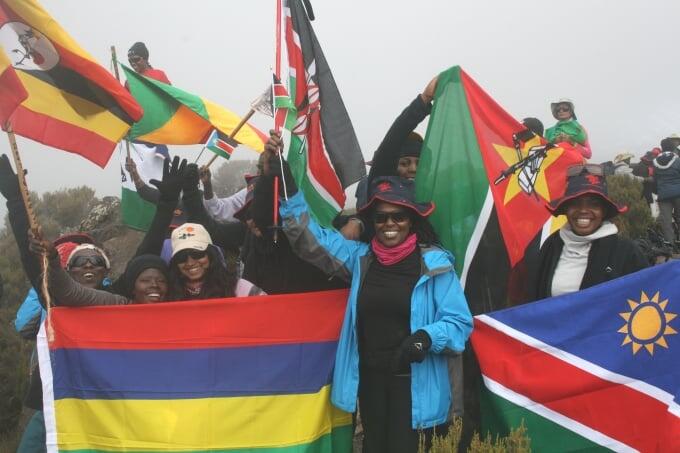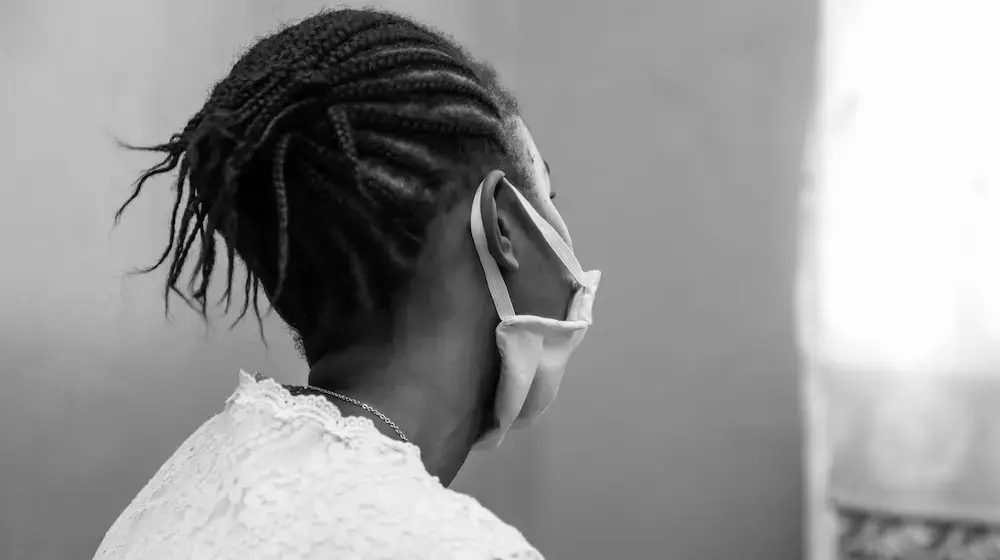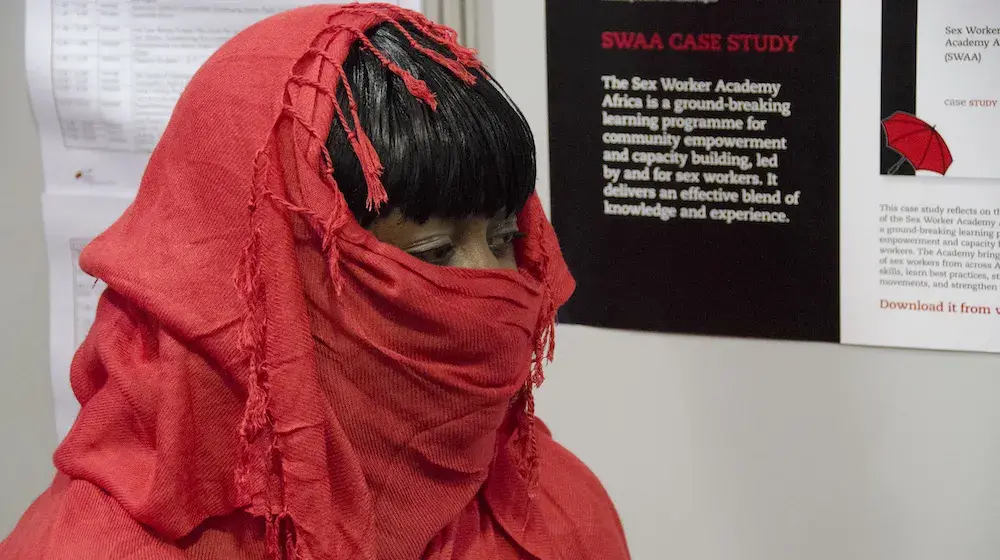This article was written by UNFPA Tanzania Communications Analyst, Sawiche Wamunza, about her climb up Mount Kilimanjaro in Tanzania along with 72 other climbers, who bore the flags of 36 African countries to raise awareness of the issue of violence against women and girls.
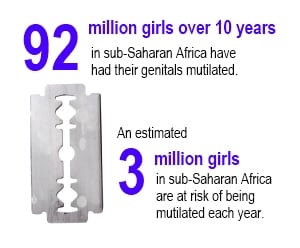
The day started off well for 15-year-old Diana Gebo. Her stepmother called and asked her to collect her long-awaited school fees. She could not foresee the nightmare that awaited her and her sister Tina, one they would remember the rest of their lives.
The year was 2009. “We had just finished dinner around 8pm,” Diana recalls. “We washed the dishes and we were getting ready to go to sleep (at her father and stepmother’s home).
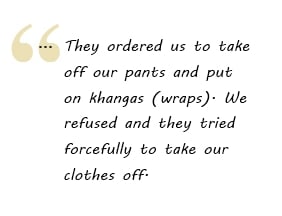
"We heard an unusual noise outside. We peeped through the window and saw Dad with women known in this area as traditional genital mutilators. Before long, our stepmother and another woman came into our room and ordered us to take off our pants and put on khangas (wraps). We refused and they tried forcefully to take our clothes off.”
In the struggle that ensued, the two young girls managed to break loose and ran off into the night, half naked. Their father, stepmother and the mutilators ran after them, calling out: “Thieves! Thieves! Thieves!” Their cries attracted a crowd of people who gave chase armed with machetes, stones and any potential weapons they could lay their hands on.
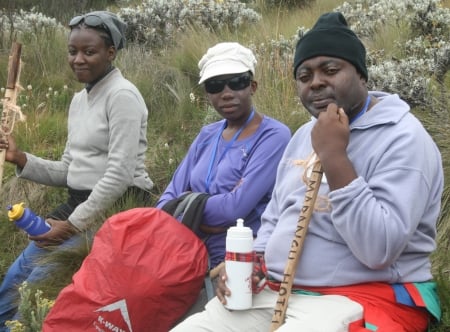
Diana and her sister were lucky – they escaped to safety. Millions of women and girls in Africa who face female genital mutilation and other types of abuse are not so lucky. In Africa alone, between 100 million and 400 million girls and women have undergone female genital mutilation/cutting and more than 3 million girls are at risk of undergoing the practice. In the northern and central zones of Tanzania, about 44 per cent of girls aged 15-19 years old underwent FGM before they were even one year old. About one third undergo cutting after they have reached 13 years. This is often linked to child marriages, which is another form of gender-based violence.
It is for this reason that Diana joined 72 courageous climbers from 36 African countries to attempt to scale Mount Kilimanjaro – ‘The rooftop of Africa’, which stands at 5,895m (19,341ft) above sea level. They carried with them their countries’ commitment to end violence against girls and women, in support of UN Secretary-General Ban Ki-moon’s campaign on violence against women and girls in Africa.
The send-off ceremony
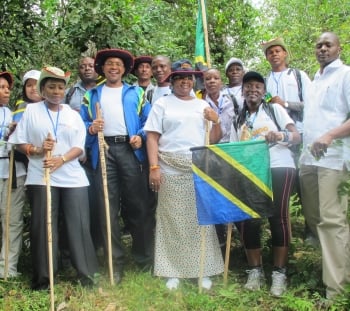
The climbers making the five-day summit attempt were given a rousing send-off by traditional dancers and South African rock band, The Parlotones, who serenaded them with their theme song, Should We Fight Back?
Tanzanian President Jakaya Kikwete made an inspiring speech at the foot of the mountain: “I want to assure you that Tanzania fully supports this campaign by saying, unite to end violence against women and girls in Africa,” he said. “The fact that 36 African countries are represented here today signifies Africa’s commitment to ending violence against women and girls on the continent. Violence prevents women from realizing their full potential and from contributing and benefiting equitably from their endeavours for their families and society. In many ways, violence against women retards their efforts for personal advancement and impedes efforts towards poverty reduction in our countries because their potential is not utilized optimally.”
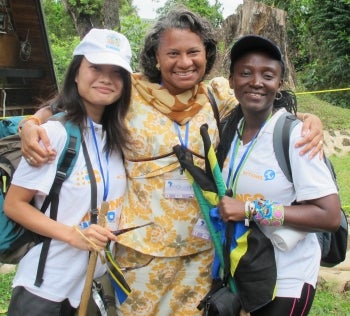
UNFPA Representative for Tanzania, Julitta Onabanjo, added her voice on the occasion: “Over 1.2 billion people in Africa are united in their actions to prevent violence, to promote fairness and justice, to end impunity and to provide services to victims of gender-based violence. I am encouraged to see over 70 climbers who will head for the summit with determination and return, carried by the conviction that every step they take will make a difference, and that they do so on behalf of the women who suffer daily from abuse from intimate partners and the people they trust the most.”
The rainforest, moorlands and ice desert
After the rousing send-off, Diana and the rest of the climbers set off to conquer Mount Kilimanjaro. Just an hour later the heavens burst open, dumping a deluge of rain and hail on the climbers – but their determination did not waiver.
They knew they had to carry the flame for as many as 70 per cent of women who experience violence in their lifetime. Gender-based violence kills and disables hundreds of women every year. In Tanzania, 20 per cent of the women have reportedly experienced sexual violence and 39 per cent of women aged 15-49 have experienced physical violence after the age of 15.
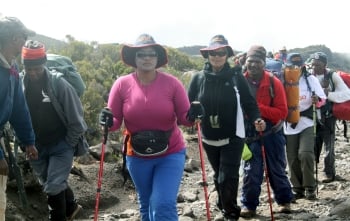
On the walk, Diana tells me she ran away from home twice because her parents wanted her to undergo genital mutilation, and she ended up living at an orphanage far from home. “After negotiations between my parents and the orphanage, I returned home thinking that my parents would not attempt the cruel act again. I was wrong. A few months later my mother was jailed for being involved in an FGM ceremony in the neighbourhood and my father and stepmother still wanted my sister and I to undergo genital cutting.”
Diana is grateful to the Media Association of Tanzania (TAMWA) for coming to her rescue. The organization pays her and her sister’s school fees and has found refuge for them at the House of Peace, a shelter for GBV survivors. Diana is one of the few who refuses to suffer in silence, courageously speaking out against GBV and what happened to her. She has been given a second chance to continue with her education and in return she will contribute to the well-being of her community, and the economic growth of the nation.
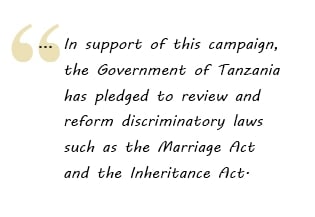
Gender-based violence is perhaps the most widespread and socially tolerated of human violations. GBV is surrounded by a culture of silence, which makes the collection of data on this sensitive topic particularly challenging. The cost to women, to children, and to families and their communities is a significant obstacle to reducing poverty, achieving gender equality and meeting the Millennium Development Goals (MDGs). Violence is traumatic and widespread. In Tanzania, women lag behind men in access to land, credit and decent jobs, and they hold fewer policy-making positions. Their inferior social roles are often justified by culture or religion, but they are not biologically determined.
Reaching the peak
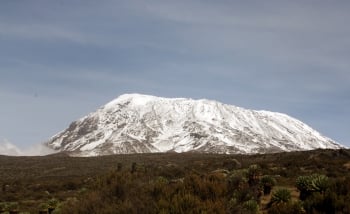
I saw Gilman’s point from afar and asked my guide, Joy, would I really make it? Then I noticed a group of climbers struggling back towards us, among them, Diana. Unable to walk on her own, she was being helped by Tim, the climb organizer. I smiled, happy that she had at least fulfilled her dream of climbing Kilimanjaro and achieving her dream of helping other girls who, like her, have been abused.
Diana pleaded for those who abuse girls to be brought to task, especially genital mutilators: “Every November and December the FGM ceremony takes place in the area where I used to live, and the community knows about this, the ward councillors know about it, but no one has taken any steps to stop it. The government should take action against these cruel people and put an end to it.”
About half of the climbers dropped out along the way, but the important point was not who made it to the top but who was committed enough to take the first step. The climbers drew attention to gender-based violence around the world, and they descended with a personal commitment to end any form of violence in their families and societies.
Seventeen climbers peak but all are courageous
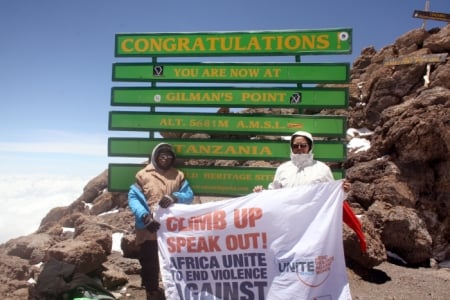
Of the 73 climbers (representing 36 African nations, United Nations organizations and non-governmental organizations, and among them youths and gender-based violence survivors) 17 summitted Uhuru Peak at 5895m, while 31 made it to Gilman’s Point (5703m). The group included six senior guides – one of whom was a 78-year-old man – 26 assistant guides, 89 porters, 14 cooks and 10 assistant cooks.
In support of this campaign, the government of Tanzania has pledged to review and reform discriminatory laws such as the Marriage Act and the Inheritance Act, to take practical measures to improve access to justice, including setting up gender desks in district police stations and referral hospitals, and to dedicate resources for gender-sensitive judicial and security sector reforms.
Mwalimu (Julius K. Nyerere, Tanzania’s first president) once said: “We, the people of Tanganyika, would like to put a candle on top of Mount Kilimanjaro which would shine beyond our borders giving hope where there is despair, love where there is hate and dignity where before there was only humiliation.” This is what the climbers’ responsibility was – to keep the candle burning bright in women’s and girls’ lives – at the top of Mount Kilimanjaro and around the world.
This is the challenge the climbers took to the top of Mount Kilimanjaro – to light a candle and keep it burning in the lives of women and girls – and indeed, around the world.
~ Sawiche Wamunza
[All photos by Sawiche Wamunza, except the ones in which she appears.]

